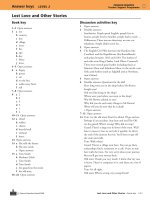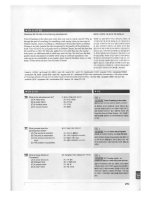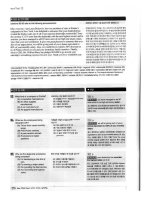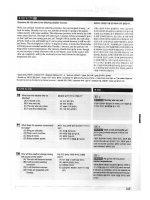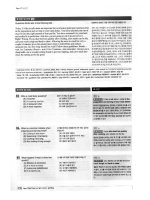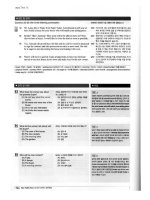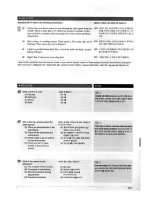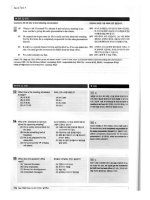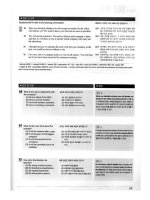TOEFL conversations answer keys
Bạn đang xem bản rút gọn của tài liệu. Xem và tải ngay bản đầy đủ của tài liệu tại đây (755.63 KB, 194 trang )
TOEFL® based listening exercises (conversations) – Answer keys
TOEFL listening conversation 1
Narrator
Listen to a conversation between a student and a university advisor. The student is trying to
decide where to go to school next year.
Advisor: Now, then, Mr., uh, Vickstad. How can I help you?
Student: Well, I'm thinking about transferring, but I'm, I'm not sure ... I was hoping you could
help me make a decision.
A: I'll try. Where are you thinking of transferring to? And why do you want to leave Kryptos
U?
S: Um...I'm thinking of going to Central University, because it's in my hometown. I've uh,
been kind of homesick here this year, and I haven't made many friends...I just feel so lonely.
So, I thought that uh, maybe, it'd be better to be closer to my parents and friends and all.
A: I see. And would you keep the same major if you transferred? What is it...business
administration?
S: Yeah, I would. The credits I've earned here will transfer to Central. I've already checked.
A: May I ask why you chose to come to Kryptos University in the first place?
S: Sure. Um, well, the main reason is you have a great business school. And the second
reason is that I...I wanted to get away from home.
A: You're right, Mr. Vickstad, we do have an excellent business school. But, so does Central.
The thing is, you've got almost a year under your belt here now. At Central, you'll be starting
from scratch.
S: Yeah, I know that. But I'm a little bit familiar with Central, 'cuz I had older friends who went
there, and I visited it before I came here.
A: You know, freshman year is usually the hardest. I remember how homesick I was my first
year. I'll tell you, I was ready to pack it in after the first two weeks. But the longer I stayed, the
more comfortable I felt. By senior year, I was glad I chose to stay.
S: Really? Did it get a lot better your sophomore year?
A: Yes, it did. You might well find the same is true for you. Also, even though your credits
here will transfer, you will have to take extra courses, because Central has different
requirements. You'll probably have to go to school for an extra year.
S: Hmm...I hadn't thought about that. I'll have to check into it. Maybe I should give it one
Photocopiable
1
© www.english-test.net
TOEFL® based listening exercises (conversations) – Answer keys
more year. I mean, it's probably good for me to learn to live away from my family and friends,
right? It'll make me stronger in the future.
A: You can always move back there after you graduate. Of course, by that time you may not
want to!
S: Thank you for all your help. I guess I'll find out the exact transfer requirements. You've
given me a lot to think about.
A: Don't mention it. If you feel like you want to talk more, don't hesitate to come back and see
me.
These answer keys refer to the audio file TOEFL_1_conversation.mp3
1. Why is the student talking to the advisor?
(A) To try and determine the best subject for him to major in.
(B) To ask about the advisor's experiences as an undergraduate.
(C) To get advice about transferring to a different university.
(D) To decide which classes would be best to take next quarter.
2. Which of these statements about the student's experience are true?
(A) He is senior at Kryptos Univeristy.
(B) He is majoring in business administration.
(C) He wanted to go to a school close to home.
(D) He has made lots of friends at Kryptos.
Narrator: Listen again to part of the passage and answer the following question(s).
(audio file TOEFL_1_conversation_excerpt.mp3)
S: Yeah, I know that. But I'm a little bit familiar with Central, 'cuz I had older friends who went
there, and I visited it before I came here.
A: You know, freshman year is usually the hardest. I remember how homesick I was my first
year. I'll tell you, I was ready to pack it in after the first two weeks. But the longer I stayed, the
more comfortable I felt. By senior year, I was glad I chose to stay.
3. Why does the advisor say this: "I was ready to pack it in after the first two weeks"?
(A) To show that she emphasizes with the student's feelings.
(B) To make the student feel foolish about wanting to leave.
(C) To demonstrate how brave he was for staying in school.
(D) To illustrate an example of his poor decision-making.
4. What will the student have to do if he transfers?
(A) Send educational records.
Photocopiable
2
© www.english-test.net
TOEFL® based listening exercises (conversations) – Answer keys
(B) Take extra courses.
(C) Change majors.
(D) Visit his friends.
5. What will most likely happen next?
(A) The advisor will call the students' parents.
(B) The student will search for more information.
(C) The student will move back to his hometown.
(D) The advisor will do research in the lab.
Photocopiable
3
© www.english-test.net
TOEFL® based listening exercises (conversations) – Answer keys
TOEFL listening conversation 2
Narrator
Listen to a conversation between two students in their first class of the term.
Arthur: Morning, Myra.
Myra: Oh hi, Arthur! You're taking Ecology Three Eleven, too?
A: Looks like it. It's my only elective this term.
M: Really? What happened?
A: Oh, I just took too many my second year, and now I've got to pick up all the required
courses I've been ignoring. University's just too much fun, I guess.
M: Too many parties?
A: No. (laughs) Well, yeh, that too. But you know-- there're just so many interesting things to
learn about, and we've only got four years here to explore them. I've been having too good a
time at it, that's all. But it has helped me decide my major, finally.
M: And?
A: Bus Ad. I've learned a lot here, and one thing I've learnt is that most fields don't hold out a
lot of promise for gainful employment! So I'm playing it safe and going for my BA in business
administration.
M: So, why Three Eleven? An ecology course isn't going to help you in your office job at
some corporation.
A: Prob'ly not, but... it still seems interesting-- and important. We all need to know about the
environment, no matter what we do for a living.
M: Yeah, you're right. And maybe you will be able to use it. Maybe you'll end up working for a
green company or something.
A: Could be. There's more and more of those every day.
M: And thank goodness. Poor old Earth!
A: Is that why you're taking this?
M: Well, it's not an elective for me. I need Three Eleven for my BS program. We need several
cross-field courses to "broaden our understanding", and this is one of them. Actually, though,
I'm looking forward to this course: "Nature's Influence on Man-- Man's Influence on Nature"!
Sounds like a really useful topic, doesn't it? And Dr Forsythe is supposed to be a very
Photocopiable
4
© www.english-test.net
TOEFL® based listening exercises (conversations) – Answer keys
engaging lecturer.
A: Well, his website is a gas, at least! He's got an hilarious little eco-game on it: shoot the
wolves and see how many deer reproduce and eat all the grass!
M: Hmm. I suppose that would teach, uh, fifth graders about the balance of nature.
A: Hey, it was fun! Anyway, he's also got some good information there-- it'll probably come in
handy when he gives us homework.
M: Wow, you're right! I better take a look at it myself. Can you give me his URL?
A: It's listed right in the course guide where they describe the course, but if you can't find it,
I'll give it to you next time. Or I could email it to you-- what's your address?
M: That would be great, thanks. Here, I'll write it down for you. Did
you pick up your textbook yet?
A: No. I've been looking for a secondhand copy before I spring for a new one. It's expensive- forty-five bucks!
M: (sighs) They all are, aren't they? Why do poor college students have to pay so much for
their textbooks? It ain't fair.
A: It's just economics. Nobody reads them except the students that take the courses. The
publishers probably didn't print more than a few hundred copies of our text, you know.
M: Still, they could print them in paperback, couldn't they? That would save us some money.
A: And on newsprint-- sure! (laughs) Some students do keep them, though, for reference
after they graduate, if they're working in that field. In that case, they need to be durable. My
dad's still got his college accounting textbooks-- and he uses them all the time.
M: I suppose you're right. Where you gonna find a used copy? At the bookstore?
A: They don't have any there now-- I checked. I put up some notes on the Science Building
bulletin boards yesterday. Maybe someone there's got one they don't want to keep anymore.
M: Well, uh, if you hear about two of them, will you let me know? I'd like to save a little
money, too.
A: Sure. If I do, I'll buy it for you and you can pay me back. How much are you willing to pay?
M: Oh, anything under thirty-five dollars'll be fine. A penny saved is a penny earned. But if
you haven't found one by next Monday, I'll have to buy a new one then, so email me Sunday
night either way, will you?
A: You bet. Oops! Here's Dr Forsythe now.
Photocopiable
5
© www.english-test.net
TOEFL® based listening exercises (conversations) – Answer keys
These answer keys refer to the audio file TOEFL_2_conversation.mp3
1. Why is the man taking this course?
(A) It's an elective.
(B) It's a required course.
(C) It's important to him.
(D) It's enjoyable for him.
2. Why is the woman taking this course?
(A) It's an elective.
(B) It's a required course.
(C) It's important to her.
(D) It's enjoyable for her.
3. What will they do next?
(A) Buy their textbooks.
(B) Email some information.
(C) Save some money.
(D) Listen to a lecture.
4. What is the purpose of this conversation?
(A) To study the text together.
(B) To pass time until class starts.
(C) To share information about ecology.
(D) To begin a relationship.
Narrator: Listen again to part of the passage and answer the following question(s).
(audio file TOEFL_2_conversation_excerpt.mp3)
Myra: ...Actually, though, I'm looking forward to this course: "Nature's Influence on Man -Man's Influence on Nature"! Sounds like a really useful topic, doesn't it? And Dr Forsythe is
supposed to be a very engaging lecturer.
Arthur: Well, his website is a gas, at least! He's got an hilarious little eco-game on it: shoot
the wolves and see how many deer reproduce and eat all the grass!
Myra: Hmm. I suppose that would teach, uh, fifth graders about the balance of nature.
Arthur: Hey, it was fun! Anyway, he's also got some good information there -- it'll probably
come in handy when he gives us homework.
5. Why does the young woman say this: "I suppose that would teach, uh, fifth graders about
the balance of nature"?
Photocopiable
6
© www.english-test.net
TOEFL® based listening exercises (conversations) – Answer keys
(A) She thinks the game is educational.
(B) She thinks the game is beneath the man.
(C) She thinks the game is inappropriate.
(D) She thinks the game is fun.
Photocopiable
7
© www.english-test.net
TOEFL® based listening exercises (conversations) – Answer keys
TOEFL listening conversation 3
Narrator
Listen to a conversation between a professor and his assistant.
Dr Abercrombie: Good morning, Hanna. Thanks for coming in. How was your holiday?
Mr Fitch: It was very good, Professor, thanks. A week in the Appalachians is really
therapeutic. Nothing to do but eat, sleep, and listen to nature. It's beautiful up there in the
spring-- the countryside is so green-- and the people are so friendly and laid back. A good
place to unwind.
Dr: I envy you. I've just got too much to get done to get away at all now. I must get this book
finished, for one thing-- my publisher's getting impatient. I've outlined the last two chapters,
though, finally, so it won't take me too much longer, I hope. Maybe I'll be able to go
somewhere at Christmas. But, um, what I wanted to talk to you about is our syllabus for this
term, Hanna. I know this is short notice, but I'd like to make a couple of little changes to it.
Mr: Uh oh! I know your idea of "little" changes!
Dr: (laughs) No, no, I don't think it'll be that bad this time. What I'd like to do is, uh, cut
Lectures Two and Three-- the ones on Old English and Middle English-- down to half their
length and then meld them together into a single lecture. Then, with that extra ninety
minutes, I want to add a lecture at the end on World Englishes. I think it's time we dealt with
that more thoroughly, don't you?
Mr: Yessir, I certainly do. That's a good idea. So I guess I just need to cut down the quizzes
to match and add a new one for World Englishes. Do you know when I'll be able to see your
revised OE and ME notes?
Dr: I've already done a good bit of that revision, Hanna, and I think I'll have them ready for
you before Lecture One. That's April eighth, I think?
Mr. Yes, Tuesday the eighth.
Dr: I've taken the segments on pronunciation out-- I think we can lose those easily enough.
Nobody really needs to recite "Beowulf" or the "Canterbury Tales" any more-- no matter how
much fun it is.
Mr: And that means you probably won't be discussing orthography much either?
Dr: I suppose not. I just want to be sure to point out clearly the main ways in which Modern
English has developed from its predecessors. You know, the Great Vowel Shift, and so forth.
Saving ninety minutes is not going to commit Old and Middle English to total oblivion, after
all.
Mr: (laughs) Not if you can help it, certainly! So I can eliminate the phonetics quiz completely,
Photocopiable
8
© www.english-test.net
TOEFL® based listening exercises (conversations) – Answer keys
then?
Dr: Yes, I think so. I'll still give them a reading just so they can get a flavour of their ancestral
tongue, but they can get as much of the phonetics as they want out of the textbook-- and it's
rote learning anyway, really.
Mr: Now, what about your new lecture, then? Can I get started on any of that?
Dr: Yes, that's where I could really use your help in the next couple of weeks. I need you to
research 'pidgins and creoles' for me. I've never paid enough attention to them, and I'd like
an idea of the number there are, uh, their distribution, and uh, what linguists are saying about
them these days-- are they English dialects? Derivative languages? What? See if you can
find me some interesting examples and some specific quotes, will you?
Mr: Yes, of course. I think I know the kind of thing you're looking for. I'll take a look for
internet sources this afternoon and then see what the library has later.
Dr: Thank you, Hanna, I'd appreciate that. And while you're there, would you see if they've
got a copy of Burnley's source book on the history of English? I can't seem to find mine.
Mr: Oh. Uh... that's because you lent it to me last term... and erm, I haven't returned it yet.
Dr: Ah. Well. Get it back to me sometime soon, then, will you? I need to refer to it for my
revisions.
Mr: Yessir, of course. Anything else on the syllabus?
Dr: Just that we'll need the student handout revised to reflect the changes. Who was in
charge of that last time?
Mr: The department secretary has the file. I'll draft a revision, let you check it, and then give it
to her, shall I? Shouldn't take long, and we just need to get photocopies before the first class.
Dr: All right, I'll leave that in your hands too then, Hanna. Just let me know if you need
anything. And I'll see you at the faculty meeting tomorrow afternoon.
Mr: Oh, yes. Yes. The faculty meeting. Oh, and if you need any anecdotes on Appalachian
English dialect, I'm your man-- I've just picked up a wealth of contemporary examples!
Dr: (laughs) I'll keep that in mind. Thanks, Hanna.
These answer keys refer to the audio file TOEFL_3_conversation.mp3
1. What is the purpose of this meeting?
(A) To renew a program
(B) To review a subject
(C) To reschedule a lecture
Photocopiable
9
© www.english-test.net
TOEFL® based listening exercises (conversations) – Answer keys
(D) To revise a course
2. Why did the assistant go to Appalachia?
(A) For research
(B) For fieldwork
(C) For relaxation
(D) For samples
3. Why will the professor give the students a reading?
(A) So they can hear Old English
(B) So they can write Old English phonetically
(C) To fill out his lecture
(D) To satisfy the requirements of the course
4. What will the assistant probably do next?
(A) Go to the library
(B) Return a book
(C) Attend a meeting
(D) Surf the Net
Narrator: Listen again to part of the passage and answer the following question(s).
(audio file TOEFL_3_conversation_excerpt.mp3)
Dr Abercrombie: I've taken the segments on pronunciation out-- I think we can lose those
easily enough. Nobody really needs to recite "Beowulf" or the "Canterbury Tales" any more-no matter how much fun it is.
Mr Fitch: And that means you probably won't be discussing orthography much either?
Dr: I suppose not. I just want to be sure to point out clearly the main ways in which Modern
English has developed from its predecessors. You know, the Great Vowel Shift, and so forth.
Saving ninety minutes is not going to commit Old and Middle English to total oblivion, after
all.
Mr: (laughs) Not if you can help it, certainly! So I can eliminate the phonetics quiz completely,
then?
Dr: Yes, I think so. I'll still give them a reading just so they can get a flavour of their ancestral
tongue, but they can get as much of the phonetics as they want out of the textbook-- and it's
rote learning anyway, really.
5. Why does Henry say this: "Not if you can help it, certainly!"?
(A) He thinks the professor should teach less Old English.
(B) He thinks the professor should teach more Old English.
Photocopiable
10
© www.english-test.net
TOEFL® based listening exercises (conversations) – Answer keys
(C) He thinks the professor considers teaching Old English important.
(D) He thinks the professor considers teaching Old English not so important.
Photocopiable
11
© www.english-test.net
TOEFL® based listening exercises (conversations) – Answer keys
TOEFL listening conversation 4
Narrator
Listen to an assistant lecturer talking to a new student.
Mr Fitch: Yes? Come in.
Mary Jane: Excuse me, are you Mr Fitch? Dr Addlestone's assistant?
MF: Hi. Yes. Can I help you?
MJ: Yes, please, if you have time. I'm Mary Jane Turner and I'm signed up for Literature
Two-twenty? I just wanted to get clear on the grading system. I'm still not sure how it works.
MF: Hi, Mary Jane. Sure. It's pretty straightforward, really. After each lecture, we prepare a
short quiz on that material, and you take it at the beginning of the next lecture period. It only
takes about ten minutes and it's pretty simple-- if you've taken good notes and studied them
a bit beforehand, that is. There are fifteen lectures, so that's fifteen quizzes.
MJ: And they're part of our final grade, right?
MF: Right. One percent each or fifteen percent for all fifteen of them.
MJ: Each one's only one percent of my grade? That doesn't seem like much. Missing one or
two of them wouldn't make much difference, would it?
MF: Not really, no-- but the whole is greater than the sum of its parts. They're not worth much
individually because they're very short and sweet-- just to check that you've been coming to
class, really. But students who pass all fifteen quizzes earn a five percent, um, bonus for
effort.
MJ: Don't our individual quiz scores count?
MF: No, sorry. They're just pass-fail quizzes.
MJ: So, pass them all and it's twenty percent of my final grade?
MF: That's right.
MJ: That sounds good.
MF: And sixty percent are your mid-term and final exams.
MJ: Are they short and sweet, too?
MF: (laughs) No, I'm afraid not. They're not like the quizzes. They're ninety-minute tests and
require a good bit of writing in addition to the objective questions. The mid-term covers the
Photocopiable
12
© www.english-test.net
TOEFL® based listening exercises (conversations) – Answer keys
first eight lectures, the Founding Fathers to Mark Twain. The final mainly covers World War
One to the present, from Lecture Nine on.
MJ: So first-half authors won't be on the final?
MF: That's not what I said. I said it's MAINLY on the second half of the course. Professor
Addlestone will be keeping you, uh, honest with a few questions about American literature
before the first World War, too.
MJ: I see. And they're thirty-thirty?
MF: Yes, thirty percent for the mid-term, thirty percent for the final, and up to twenty percent
for the weekly quizzes. And then up to ten percent each for your essays. You'll need at least
ninety percent for an A, eighty percent for a B, and seventy percent for a C.
MJ: Erm....could you tell me something about what is expected with our essays? There're
two of them, right?
MF: Yes. You're required to write two short critical essays on American authors of your
choice, from anywhere in American literary history, and we'll be looking carefully at your
writing style and ability as much as at the content of your essays. The Professor's a real
stickler for overall literacy.
MJ: So I can choose any author in the syllabus?
MF: Yes, but I can tell you that we often like it when a student picks an author out of the
mainstream-- perhaps a lesser writer that we haven't been able to include in the lectures, or
a contemporary author who hasn't, uh, hasn't found a place in literary history yet.
MJ: Someone really obscure?
MF: Not a good idea. The author you choose should have some relevance to the course of
American literature. And if you can demonstrate that relevance clearly in four to five
typewritten pages, then you'll have a good essay.
MJ: For each essay? Ooh.
MF: This is a university, uh, Mary Jane, not a high school. Now, you've got almost four
months to write eight to ten pages. You should be able to manage that.
MJ: Yes, OK. You're right. When are they due?
MF: Your first essay's due in late October. It must be handed in by Lecture Eight, but we'd be
happy to see it anytime before that. And the second is due at the last lecture in December. It
must be turned in before the winter break.
MJ: Oh-- should the first essay be about somebody in the the first half's material then? And
the same for the second?
Photocopiable
13
© www.english-test.net
TOEFL® based listening exercises (conversations) – Answer keys
MF: No, not at all. Any author you like. It would be smart to choose ones that interest you,
though. Papers that reflect some, um, enthusiasm always turn out better.
MJ: Oh, I've got that! I'm really looking forward to this course-- I love reading!
MF: That's good, because you'll be doing a lot of that.
MJ: Thanks for your help, Mr Fitch-- I really appreciate it.
MF: And don't be shy if you have any more concerns, Mary Jane. My door's always open.
Good-bye.
These answer keys refer to the audio file TOEFL_4_conversation.mp3
1. What is the purpose of this conversation?
(A) To acquaint the student and the assistant lecturer
(B) To find out about the American authors being taught
(C) To ascertain the grading method of the course
(D) To figure out how to study for the lectures
2. How long should the student's essays be?
(A) Four pages
(B) Four months
(C) Four lectures
(D) Four authors
3. If the student passes all fifteen quizzes, how much of her final grade will they represent?
(A) 10%
(B) 15%
(C) 20%
(D) 30%
Narrator: Listen again to part of the passage and answer the following question(s).
(audio file TOEFL_4_conversation_excerpt.mp3)
Mr Fitch: And sixty percent are your mid-term and final exams.
Mary Jane: Are they short and sweet, too?
MF: (laughs) No, I'm afraid not. They're not like the quizzes. They're ninety-minute tests and
require a good bit of writing in addition to the objective questions. The mid-term covers the
first eight lectures, the Founding Fathers to Mark Twain. The final mainly covers World War
One to the present, from Lecture Nine on.
Photocopiable
14
© www.english-test.net
TOEFL® based listening exercises (conversations) – Answer keys
MJ: So first-half authors won't be on the final?
MF: That's not what I said. I said it's MAINLY on the second half of the course. Professor
Addlestone will be keeping you, uh, honest with a few questions about American literature
before the first World War, too.
4. Why does Mary Jane say this: "Are they short and sweet, too?"
(A) She thinks the examinations will be very easy.
(B) She is flirting with Mr Fitch.
(C) She thinks the examinations will be very difficult.
(D) She is joking with Mr Fitch.
5. What will Mary Jane probably do?
(A) Research American writers
(B) Miss some lecture quizzes
(C) Visit Dr Addlestone's office
(D) Buy a typewriter
Photocopiable
15
© www.english-test.net
TOEFL® based listening exercises (conversations) – Answer keys
TOEFL listening conversation 5
Narrator
Listen to a conversation between two students in their dormitory during Registration Week.
Roger: Hi, can I come in?
Terry: Oh, hi. Sure! You must be Roger?
R: Yes. And you're Terry, uh, Lawrence?
T: Yep. So we're roomies this year, eh? Nice to meet you.
R: Good to meet you, too.
T: Well, uh, I guess the first thing is-- which bunk do you want?
R: Ha! Oh, I don't mind, really. The top's fine. You can have the lower one.
T: OK, thanks, I'll take it! I am a bit afraid of falling off. I did that more than once when I was a
kid. It doesn't hurt, really, but it sure knocks the wind out of you!
R: (laughs) Well, I'll try not to roll over in my sleep. Actually, it looks like fun sleeping up
there. I've never slept in a bunk bed before, though. What's your major?
T: Oh, I'm supposed to be in pre-med, but I've been taking a lot of electives. I might change
it. What's yours?
R: I'm just an aggie. We've got a ranch out west of Houston, and I'm thinking I might become
a vet. You're pre-med? Then you've taken Chemistry One Twenty-one? It's a required course
for me, and I'm not good in chemistry at all. Maybe I could borrow your notes?
T: Hah! "Bonehead Chemistry"-- no, sorry. I still have to take that, too. Hey, maybe we could
sign up for the same sections.
R: Yeah, that's a good idea!
T: When do you register?
R: Oh. Let me see. Wait a sec. Uh...ah, here it is: ten a.m. Monday.
T: Great! I register at nine. The Bonehead lectures are Tuesdays and Thursdays, and the
labs are Monday-Wednesday-Friday afternoons. I can register first and then let you know
which sections I've got before you register at ten. What times are good for you?
R: Oh gosh. Maybe, early lectures and a Friday lab? I think better in the morning, and that's
going to be a tough course.
Photocopiable
16
© www.english-test.net
TOEFL® based listening exercises (conversations) – Answer keys
T: I know. That's why I'm thinking about switching majors-- the science prerequisites are
really awful. But I'll give it one more semester before I pack it in. You sure you want a Friday
lab? It'll cut your weekend short.
R: Yeah, but I'm gonna have a full load this semester, so I gotta take something Friday
anyway. Might as well be something I can cut.
T: OK then. So, should I meet you back here Monday about nine-thirty? I can give you my
schedule then.
R: Uh, how about in the cafeteria? I'd like to get some coffee before I start-- I'll need the
energy. And it's handier anyway.
T: Sure, that's fine-- let's do that, then. But maybe we'd better get a little organized around
here. I've already put my clothes in the left-hand dresser. Do you mind if I set one of my
stereo speakers on the corner of the right-hand one?
R: No, that's OK. I didn't bring much stuff-- just the basics till I know what I need. If I need
that space later, we can hang the speaker on the wall.
T: And I took over half the closet.
R: That bookcase looks pretty small. Most of my stuff is books.
T: Yeah, I've got a lot of those, too-- and we haven't even got this term's texts yet. (Sighs in
thought) D'you think we could get one the same size from Campus Stores and put it on top of
that one? They've got a free furniture place there.
R: Well, we could at least run over and take a look. I'll bet the bookcases are all gone,
though-- they're going to be a popular item. Tell you what: I'll go over there after I see you
Monday morning. Maybe they'll have an early-bird special.
T: OK, good. And if they don't, we'll just have to make do for now. (Pause) Shoes.
R: Huh?
T: Where can we put our shoes? Where'd you stash yours?
R: Oh. There, under the bed. One advantage of sleeping on the bottom bunk.
T: Wait a minute!
R: Just kidding. Stuff whatever you like under there, too. Half is yours. Just got those two
bags?
T: No, I've also got two cartons of books and junk coming later. I'll worry about them then. All
your stuff here?
Photocopiable
17
© www.english-test.net
TOEFL® based listening exercises (conversations) – Answer keys
R: Yep. But I need to go to a drugstore and pick up some toilet paper and kleenex sometime
soon. Wanna come?
T: Yes, that's just what I have to do, too-- get some toothpaste and stuff. Gimme a minute
and we can go together now.
R: Great!
These answer keys refer to the audio file TOEFL_5_conversation.mp3
1. Why are these young men in conversation?
(A) They are getting acquainted.
(B) They are distributing their belongings.
(C) They are deciding their majors.
(D) They are composing a shopping list.
2. Where will they keep their shoes?
(A) in the closet
(B) under the bed
(C) in their cartons
(D) side by side
3. Where have they arranged to meet?
(A) at the campus stores
(B) back at their room
(C) at the registration desk
(D) in the campus restaurant
Narrator: Listen again to part of the passage and answer the following question(s).
(audio file TOEFL_5_conversation_excerpt.mp3)
Roger: I'd like to get some coffee before I start-- I'll need the energy. And it's handier
anyway.
Terry: Sure, that's fine-- let's do that, then. But maybe we'd better get a little organized
around here. I've already put my clothes in the left-hand dresser. Do you mind if I set one of
my stereo speakers on the corner of the right-hand one?
Roger: No, that's OK. I didn't bring much stuff-- just the basics till I know what I need. If I
need that space later, we can hang the speaker on the wall.
4. Why does the young man say this: "Do you mind if I set one of my stereo speakers on the
corner of the right-hand one?"
Photocopiable
18
© www.english-test.net
TOEFL® based listening exercises (conversations) – Answer keys
(A) The space belongs to the other young man.
(B) He has too much equipment.
(C) He needs help lifting the speaker.
(D) He is concerned about the other young man's hearing.
5. What will probably happen next?
(A) They will set up the sound system.
(B) They will agree on a shopping list.
(C) They will pick up a bookcase.
(D) The young man will finish unpacking his suitcases.
Photocopiable
19
© www.english-test.net
TOEFL® based listening exercises (conversations) – Answer keys
TOEFL listening conversation 6
Narrator
Listen to a conversation between a student and a registration clerk during Registration Week.
Registrar 1: Next.
Terry: Hi. Chemistry One Twenty-one, morning lectures. Are sections-- ?
R1: Oh, sorry, you're at the wrong table. This is Upper Division sciences. University College
courses are at Tables Four through Nine.
T: Really? Damn.
R1: Let's see. Chemistry? You want Table Five, Physical and Social Sciences.
T: OK, thanks very much. (He goes.)
R2: Next, please.
T: Good morning. Have you got Bone-- uh-- Chemistry One Twenty-one here?
R2: Yes. Could I see your student ID card, please?
T: Here you are.
R2: Thank you. Now... One Twenty-one...what sections would you like?
T: Uh, Tuesday and Thursday, Sections One or Two?
R2: There're spaces available in both of those. Section One starts at seven forty-five a.m.
and Two is from nine to ten.
T: Well, seven forty-five's a little early for me. It's the same lecturer for both sections, isn't it?
R2: Sorry, you'll have to check that in your Course Guide.
T: How many spaces are left in Section Two?
R2: It's a little early for a lot of students. Section One still has about forty spaces left, but Two
only has ten.
T: Rats. I want to be in the same section as my roomie, but he doesn't register until ten
today, and by then, those may be gone. All right, give me Section One, please.
R2: There you are. And what about your lab section?
Photocopiable
20
© www.english-test.net
TOEFL® based listening exercises (conversations) – Answer keys
T: I think any Friday section is OK for me.
R2: Section Twenty-one is twelve to two o'clock, Section Twenty-two is one to three, Section
Twenty-three is two thirty to four thirty, and Section Twenty-four is three thirty to five thirty.
T: All right then, let me have the one-to-three o'clock one. Section Twenty-two?
R: Yes, there you are.
T: Thanks. And can I register for Ethology Two Sixty-three here, too?
R2: Yes. But, um... there's only one section in that course: Monday-Wednesday-Friday from
one o'clock to two. You've got a conflict with your chem lab.
T: Oh, no! (sighs)
R2: Do you want your laboratory on a different day?
T: No. Uh, what were the times on those other lab sections again?
R2: Twelve to two, one to three, two thirty to four thirty, and three thirty to five thirty.
T: I'll take two thirty to four thirty, then. Could I change this card for that one? Sorry.
R2: Sure, here you go. And here's your section card for Ethology.
T: Thanks very much. Are there plenty of spaces left in Twenty-three?
R2: They won't go in an hour. Your friend should have no trouble getting one. Is that it now?
T: That'll do it, thanks.
R2: OK. Please print your name and student number clearly in the blanks on each card.
T: OK. "Ter-ry...mm...eight four four four one...mmm...." There you are.
R2: And don't forget to write these into your class schedule: Chemisty One Twenty-one,
Lecture Section One, Tuesday and Thursday, seven forty-five. Laboratory Section Twentythree, Friday, two thirty. Ethology Two Sixty-three, Monday-Wednesday-Friday, one to two
p.m.
T: Thanks very much for your help!
R2: Have a nice day. Next, please?
These answer keys refer to the audio file TOEFL_6_conversation.mp3
1. Which best describes the student's current activity?
Photocopiable
21
© www.english-test.net
TOEFL® based listening exercises (conversations) – Answer keys
(A) He is collecting his time cards.
(B) He is seeking a program.
(C) He is filling in his timetable.
(D) He is completing his schedule.
2. What is the problem with Laboratory Section 22?
(A) He needs to take another class first.
(B) It is held at the same time as another class.
(C) It is too late on Friday.
(D) It is too early in the morning.
3. For how many sections does the student register?
(A) 1
(B) 2
(C) 3
(D) 4
Narrator: Listen again to part of the passage and answer the following question(s).
(audio file TOEFL_6_conversation_excerpt.mp3)
Terry: I'll take two thirty to four thirty, then. Could I change this card for that one? Sorry.
Registrar 2: Sure, here you go. And here's your section card for Ethology.
T: Thanks very much. Are there plenty of spaces left in Twenty-three?
R2: They won't go in an hour. Your friend should have no trouble getting one. Is that it now?
T: That'll do it, thanks.
4. Why does the young man say this: "They won't go in an hour"?
(A) To reassure the student
(B) To caution the student
(C) To remind the student
(D) To console the student
5. How would you characterize the student?
(A) He is a morning person.
(B) He is a night owl.
(C) He is an eager beaver.
(D) He is lackadaisical.
Photocopiable
22
© www.english-test.net
TOEFL® based listening exercises (conversations) – Answer keys
TOEFL listening conversation 7
Narrator
Listen to a conversation between two students at their university cafeteria.
Tom: Oh, there you are.
Ralph: Hi. Did you get the classes you wanted?
T: Not really. My Physics lectures are eight to nine in the morning Tuesday and Thursday.
Those're gonna be killers. I'm gonna need two alarm clocks. And I got a Friday lab from two
to four. I couldn't get an earlier one because they conflict with my Biology course. It's only
has one section, so I have no choice there.
R: Those Friday classes sure spoil a four-day week, don't they? (Laughs) Want some
coffee?
T: Uh, sure. You still got time before you register?
R: There's still a few minutes till ten, and they don't let you start early. They're pretty strict-they won't let you in there till your time comes.
T: That's because it's so crowded, I guess. Registering eighteen thousand students in four
days makes it pretty busy over there.
R: I'll be right back. (He gets them coffees.) There you are. (Pause) Coffee. I'm gonna be
drinking a lot of that this semester.
T: Me too, I guess.
R: Did you pick up a cafeteria cash card yet?
T: No, not yet. I've gotta go to the bank first. The biggest card they've got is a hundred
dollars, isn't it?
R: I think they've got a two-hundred dollar one this year. Prices have gone up so much
they've added a new denomination-- like Zimbabwe does! But I've still got some money on
my last year's card, so I haven't checked for sure yet.
T: Well, I'll take out two hundred bucks just in case. Might as well get the biggest one-- I'll be
using it all, that's for sure. I practically live over here. It's a good place to study.
R: Can I sublet your half of the room then? (Laughs)
T: (Laughs) Gee, maybe we should. Pick up some extra money. They say there's a real
shortage of dorm space this year.
Photocopiable
23
© www.english-test.net
TOEFL® based listening exercises (conversations) – Answer keys
R: How come? The student body's about the same as last year, I think. Or smaller-- tuition's
gone up again and I'll bet some students just couldn't afford it this year, with this slow
economy.
T: No, it's because they tore down Dormitory A to put up a new one-- but all they've got is the
shell so far. That plumbers and electricians strike this summer sure threw a monkey wrench
into the construction schedule. It won't be finished now till the end of December at least.
R: Wow! There must've been five hundred rooms in Dorm A! That's a big dent in campus
housing, all right. Are they doing anything about it?
T: Well, I hear the Housing Office is trying to lease as many off-campus units as they can
find, but most of them are rented to students already.
R: Too bad. I wouldn't want to live off-campus anyway, though.
T: Why not?
R: Well, it's so cheap and easy to live right here. The rent's less than half of what we'd have
to pay out there, and we're right on campus within a few minutes of everyplace. The only
problem is the roommates they give you.
T: (Laughs) Yeah? Well, you're stuck with this one for the rest of the year at least, pal! But
y'know, of we stayed roomies, we could share the rent on an apartment somewhere not too
far off. So it wouldn't cost that much-- and think of the parties we could throw! You can't have
a real party in a dorm room.
R: Huh! Yeah. That's something to think about. Let's keep our eyes open for a place for next
year, then.
These answer keys refer to the audio file TOEFL_7_conversation.mp3
1. What are the two students doing?
(A) Discussing their programs
(B) Choosing an apartment
(C) Socializing
(D) Settling their differences
2. What's wrong with Friday classes?
(A) They're too late.
(B) They're too early.
(C) They make a two-day weekend.
(D) They make a four-day week.
3. Why is housing limited this year?
Photocopiable
24
© www.english-test.net
TOEFL® based listening exercises (conversations) – Answer keys
(A) Prices have risen.
(B) A building has been razed.
(C) Off-campus apartments are leased.
(D) There is a strike at the university.
4. What are the two roommates considering for the future?
(A) Moving
(B) Banking
(C) Separating
(D) Registering
Narrator: Listen again to part of the passage and answer the following question(s).
(audio file TOEFL_7_conversation_excerpt.mp3)
Tom: Well, I'll take out two hundred bucks just in case. Might as well get the biggest one-- I'll
be using it all, that's for sure. I practically live over here. It's a good place to study.
Ralph: Can I sublet your half of the room then? (Laughs)
T: (Laughs) Gee, maybe we should. Pick up some extra money. They say there's a real
shortage of dorm space this year.
R: How come? The student body's about the same as last year, I think. Or smaller-- tuition's
gone up again and I'll bet some students just couldn't afford it this year, with this slow
economy.
5. Why does the roommate say this: "Can I sublet your half of the room then?"
(A) He wants to augment his income.
(B) He thinks his roommate is leaving.
(C) He is concerned about their relationship.
(D) He is teasing his roommate.
Photocopiable
25
© www.english-test.net
